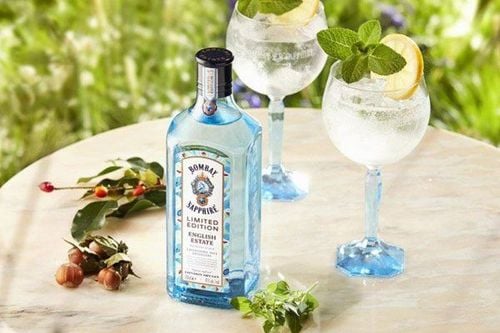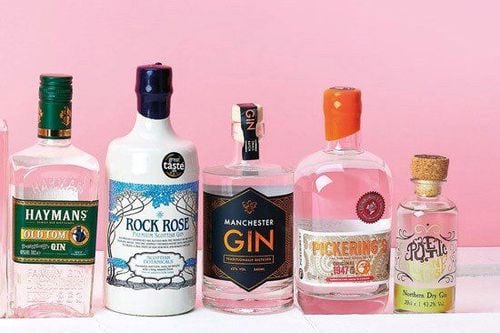This is an automatically translated article.
Gin is made from juniper berries, low-calorie gin and botanical properties that survive the distillation process offer many health benefits. So is gin good for you? And what are the pros and cons of a gin tonic? Find out more articles below.1. What is gin and gin tonic?
Gin is derived from the Dutch Jenever. After Jenever is made by distilling and adding some herbs, another drink is created, called Gin. However, although Gin is of Dutch origin, it is not. In the 17th century, when the British learned and developed how to make Gin better and cheaper, Gin began to be popular and not well known to many people. develop in the market. When the kings of England allowed the unlicensed production of gin and imposed heavy taxes on imported alcohol, gin became a popularly accepted low-priced alternative. Today, gin is enjoying a resurgence thanks to its relative affordability and popularity among craft producers. In recent years in Western countries, this is considered one of the most popular spirits, especially in classic cocktails. The concentration of Gin ranges from 34%-47% Alc.To produce Gin, it is necessary to have indispensable ingredients including barley, wheat, and rye. However, the distinctive flavor of Gin lies in the herbs it is distilled with. In addition to the main flavor is juniper (juniper berries), Gin needs more herbs that make Gin have a taste not to be confused with other alcohols such as cinnamon, angelica root, anise, lemon peel, etc. Orange peel, coriander, nutmeg... Like other alcohols, Gin is produced by fermenting and distilling in vertical pots, like columns. The use of such distillers helps to give Gins a high concentration but still ensures their gentle and pure taste. Herbs are added in two ways. The first way is that the herbs are pre-soaked in the base wine and then distilled. The second way is that the herbs will be separated by placing them inside designer baskets, then put in the distillation pot and do the distillation. This way will help the taste of Gin be stronger, keep the taste longer than the first method.

Rượu gin là loại rượu được làm từ quả bách xù
Calories: 64 calories Protein: 0 grams Fat: 0 grams Carbohydrates: 0 grams Gin contains less sugar, so the calories in Gin are lower than some. other wines. If any of us have ever had a drink of Gin, we may have noticed that Gin is considered a slightly healthier choice than other alcohols like Whiskey, Rum or Vodka.
Currently, Gin is famous all over the world, there are many popular types of Gin such as Bombay Sapphire, London Dry Gin, Plymouth Gin, Old Tom Gin, Genever Gin,...and some cocktails are made from Gin such as Sloe Gin Fizz, Gimlet cocktail, ... including Gin Tonic - an indispensable cocktail for those who often use cocktails because the taste it brings is very special, can be addictive right away. first time using. Initially, a doctor George Cleghorn discovered that the compound Quinine could help prevent and treat malaria - a disease that is affecting the health and lives of soldiers and civilians. in India is very large. At that time, India was also one of the British colonies. That Quinque compound can fortunately be absorbed through Tonic drinking water, however its bitter taste is quite unpleasant. Then, with the thought of making a drink easier to drink. An officer tried to use water, sugar, lemon and gin to combine with tonic water. They finally made it and the wine called Gin Tonic was born.
Soldiers were served this drink, which made them even more amused. But after that period, this drink to the present has many changes. More suitable and of course will taste better with the majority of drinkers. Tonic waters today typically contain less quinine and tend to be sweeter and less bitter. Combined with Gin, it will make them a refreshing, delicate cocktail to cool off on hot summer days.

Rượu gin giúp người uống cảm thấy thư giãn và không sợ bị say
2. Is Gin good for you?
Gin is considered a popular alcohol today, mixed in many forms to bring unique flavors to each type. Gin is most often used in cocktail preparation, helping drinkers feel relaxed after a working day, drinkers can use a lot without fear of getting drunk. In addition, a number of articles have suggested the benefits of drinking gin due to the effects of the properties of juniper berries, from which gin is made although there is no evidence that antioxidants. of juniper that survives fermentation. When used as a control in a red wine study, gin showed no special antioxidant properties. However, there are a number of health benefits associated with consuming any form of alcohol from light to moderate levels. That is, consuming about 1 drink a day for women and 1-2 drinks for men reduces their risk of heart disease and other conditions. Although light drinking had a positive effect on them, heavy drinking negatively affected or increased the risk for conditions such as hypertension, coronary artery disease, heart failure, and ischemic stroke. , metabolic cardiovascular disease , type 2 diabetes . However, to confirm the relationship between moderate drinking and these effects, researchers need to control for other factors.Thus, Gin is a type of alcohol that has been around for a long time and has developed to this day in many different forms of alcohol, giving users different flavors. Sometimes, people mix and use Gin as a delicious cocktail, which can even be addictive for users. Gin can help users feel refreshed, comfortable, and reduce stress after busy work. However, we should not use too much Gin, so drinking 1-2 glasses is enough.
Please dial HOTLINE for more information or register for an appointment HERE. Download MyVinmec app to make appointments faster and to manage your bookings easily.
Reference sources: webmd.com, wideopeneats.com












